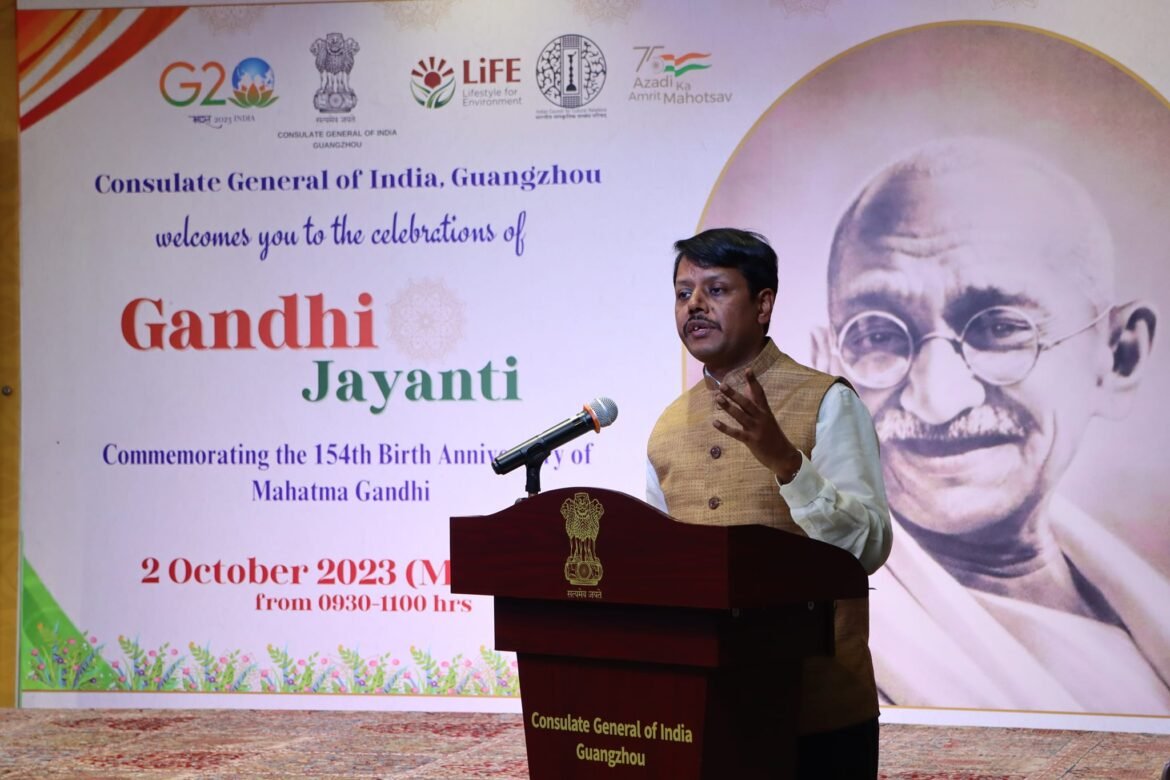In a unique and meaningful event, Gandhi Jayanti was celebrated differently in China this year, showcasing a blend of Indian culture and local Chinese appreciation for Mahatma Gandhi’s teachings. The celebration took place at the sprawling Chaoyang Park in Beijing, home to a statue of Gandhi sculpted by renowned Chinese artist Professor Yuan Xikun. The day was marked by a variety of performances and tributes, highlighting Gandhi’s enduring influence on both the Indian and Chinese communities.
Celebrations at Chaoyang Park
On Wednesday, local schoolchildren in Beijing recited Mahatma Gandhi’s teachings in Mandarin, reflecting the growing cultural exchange between India and China. The children’s recitation was a powerful reminder of the universal relevance of Gandhi’s messages of peace, non-violence, and truth. The teachings, delivered in China’s native language, highlighted how Gandhi Jayanti was celebrated differently in China by embracing local traditions while honoring the Indian leader’s legacy.
In addition to the recitation, the event featured a captivating Odissi dance performance by Beijing-based dancers, led by renowned Odissi artist Zhang Jinghui. The troupe performed to the tune of “Vaishnav Jan To,” one of Gandhi’s favorite bhajans, which brought a sense of grace and spirituality to the occasion. The combination of Indian classical dance and Chinese performers beautifully symbolized the cultural harmony between the two nations.
Floral Tributes and Political Significance
Indian diplomats, led by Ambassador Pradeep Kumar Rawat, along with members of the Indian diaspora and local Chinese admirers of Gandhi, paid floral tributes to the statue of Mahatma Gandhi. The statue, which was installed in 2005 by Professor Yuan Xikun, has since become a symbol of India-China friendship. In his speech, Ambassador Rawat expressed his appreciation for Professor Yuan’s work, noting that the statue represents not only Gandhi’s contributions to India but also his global influence as a champion of peace and non-violence.
The Gandhi Jayanti Celebrated Differently In China event also carried political significance. The presence of Gandhi’s statue in the heart of Beijing serves as a reminder of the different yet parallel journeys of India and China during their respective struggles for independence. While Gandhi led a peaceful movement against British rule, Mao Zedong’s approach to revolution in China was markedly different. However, the recognition of Gandhi’s contributions in China speaks to the common values of liberation and justice that both nations share.
Cultural Performances and Indian Diaspora’s Involvement
One of the most unique aspects of how Gandhi Jayanti was celebrated differently in China was the staging of a play titled “Ahimsa: The Gandhi Way,” directed by Ketkee Thakar and written by Ayushi Sugandhi. The play, performed by members of the Indian community in Beijing, portrayed the life and philosophy of Mahatma Gandhi, with a particular focus on his principle of non-violence (Ahimsa).
This theatrical performance added an educational element to the celebration, allowing both the Indian and Chinese audience to reflect on the relevance of Gandhi’s teachings in today’s world. The Indian diaspora in China has long been involved in fostering cultural exchanges, and this event further strengthened the connection between the two countries.
Gandhi’s Global Impact and International Day of Non-Violence
The significance of Gandhi Jayanti extends beyond India, as the United Nations has declared it the International Day of Non-Violence. During his speech, Ambassador Rawat emphasized that Gandhi was not only a leader of the Indian independence movement but also a visionary whose values of truth, non-violence, and social justice continue to inspire people globally. He noted that observing Gandhi Jayanti as the International Day of Non-Violence is a fitting tribute to the man who dedicated his life to promoting peace and understanding.
Professor Yuan Xikun, although unable to attend the event due to illness, sent a message expressing his admiration for Gandhi and the Indian community’s ongoing efforts to honor his legacy. He stated that the statue of Gandhi in Chaoyang Park has become a symbol of friendship between the people of India and China. Over the years, the Indian Embassy and local community members have gathered at the statue to pay their respects, highlighting the deep connection between the two nations through their shared values of peace and cooperation.
Conclusion
Gandhi Jayanti Celebrated Differently In China this year highlighted how Gandhi’s legacy transcends borders and cultures. The event in Beijing’s Chaoyang Park not only honored the Indian leader’s life and teachings but also showcased the growing cultural ties between India and China. The blend of Chinese and Indian traditions, from schoolchildren reciting Gandhi’s teachings in Mandarin to the Odissi dance performance, symbolized a mutual respect for each other’s heritage.
As the world continues to grapple with conflicts and challenges, Gandhi’s message of non-violence and peace remains as relevant as ever. The celebrations in China serve as a reminder that Gandhi’s vision was not just for India but for the world, and his influence continues to inspire global efforts toward peace, justice, and harmony.
Stay connected to know more on arcnews.online for global news like Gandhi Jayanti Celebrated Differently In China. For videos updates visit our YouTube. Do subscribe to Arcnews to get latest updates directly in your mail box.
Have A Great Day.


